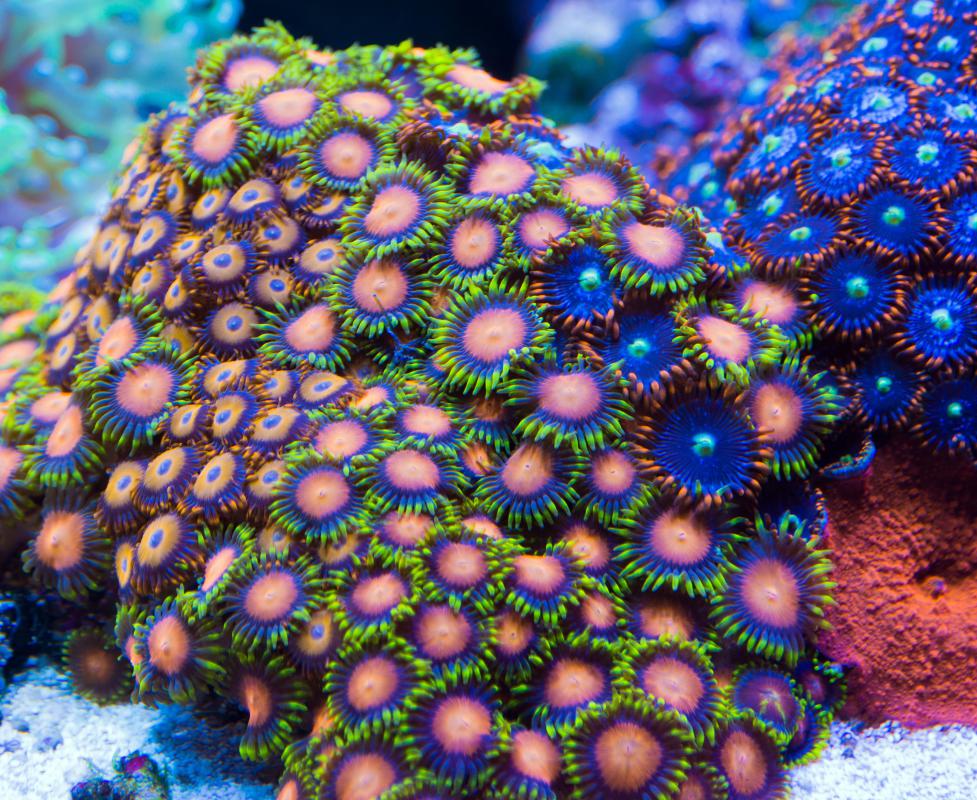At AllThingsNature, we're committed to delivering accurate, trustworthy information. Our expert-authored content is rigorously fact-checked and sourced from credible authorities. Discover how we uphold the highest standards in providing you with reliable knowledge.
What Is Coral Conservation?
Coral conservation is a type of environmental conservation activity that focuses on preserving the world's coral reefs. Coral reefs are believed to offer a home to as much as one-quarter of the world's marine animals, and are among the most diverse ecosystems in the world. Climate change, pollution, increasing populations along the world's coasts, and over-fishing are believed to be contributing to the deterioration of the world's coral reef ecosystems. Coral conservation seeks to protect the world's coral reefs by changing fishing and tourist practices, as well as helping to introduce sustainable living practices that can help reduce damage to coral ecosystems. If the world's coral reefs are allowed to deteriorate and die, marine bio-diversity will suffer, as will local economies that rely on coral reef fish for food and tourism for trade.
Scientists believe that coral reefs are some of the world's most sensitive ecosystems. As a result, they are generally the first to suffer the effects of climate change and pollution. Experts believe damage to coral reefs done by pollution and climate change could be indicative of more severe environmental consequences in the future.

The maintenance of healthy coral ecosystems is also considered important for the communities that rely on these ecosystems for tourism trade and food. Many coastal communities in Indonesia and Central America, as well as other locations, rely on healthy coral reefs to provide the fish that is central to the native diet. Tourists often flock to these areas to view the coral reefs and the fish that live there. Many species of marine fish rely on being able to congregate at coral reefs during certain times of the year, even if they do not live there year-round.

The objectives of coral conservation include teaching local communities to care for their coral ecosystems, and helping to revitalize coral by re-introducing various species to degraded areas of coral. Fishing can be conducted in a way that does not damage the coral. Trawling the sea floor is generally not advised, and limits on how many fish can be caught are often imposed. Coral conservation also generally requires minimizing pollution from coastal communities, and regulating tourism so that heavy tourist traffic does not degrade the quality of coral ecosystems. Since rising sea levels and temperatures can affect coral ecosystems, scientists typically advise overall, worldwide energy conservation that can help to slow climate change.
Frequently Asked Questions
What is coral conservation and why is it important?

Coral conservation refers to the efforts to protect and restore coral reef ecosystems, which are vital to marine life. These reefs provide habitat for countless species, support fishing industries, protect coastlines from erosion, and contribute to carbon sequestration. According to the World Wildlife Fund, around 25% of marine species depend on coral reefs at some point in their life cycle, highlighting the importance of their preservation.
What are the main threats to coral reefs?
The primary threats to coral reefs include climate change, which causes ocean warming and acidification; overfishing, which disrupts ecological balance; pollution from land-based sources that leads to water contamination; and destructive fishing practices like blast fishing. The International Union for Conservation of Nature (IUCN) reports that about one-third of all coral species are at risk of extinction due to these threats.
How does climate change affect coral reefs?
Climate change affects coral reefs primarily through increased sea temperatures, leading to coral bleaching, where corals expel the algae living in their tissues, losing their color and vital energy source. Additionally, ocean acidification, a result of increased CO2 absorption, weakens coral skeletons, making it harder for corals to grow. The National Oceanic and Atmospheric Administration (NOAA) states that we have lost half of the world's coral reefs in the last 30 years.
What are some effective coral conservation strategies?
Effective coral conservation strategies include establishing marine protected areas (MPAs) to safeguard habitats, enforcing sustainable fishing practices, reducing carbon emissions to mitigate climate change, and restoring damaged reefs through coral gardening and transplantation. Organizations like the Coral Restoration Foundation have successfully planted tens of thousands of corals back onto degraded reefs, showcasing the potential of restoration efforts.
Can coral reefs recover from damage, and how long does it take?
Coral reefs can recover from damage if conditions improve and stressors are removed, but recovery is a slow process that can take decades. The resilience of a reef and the extent of the damage play crucial roles in recovery time. For instance, the Great Barrier Reef Marine Park Authority notes that fast-growing corals may take 10-15 years to recover, while slower-growing species may need much longer.
How can individuals contribute to coral conservation?
Individuals can contribute to coral conservation by reducing their carbon footprint, supporting sustainable seafood choices, avoiding products that harm reefs (like certain sunscreens), participating in reef cleanups, and educating others about the importance of reefs. Donations to conservation organizations and responsible tourism practices also make a significant impact. The Nature Conservancy suggests that even small actions, when multiplied across many individuals, can lead to substantial positive changes for coral reefs.
AS FEATURED ON:
AS FEATURED ON:













Discuss this Article
Post your comments